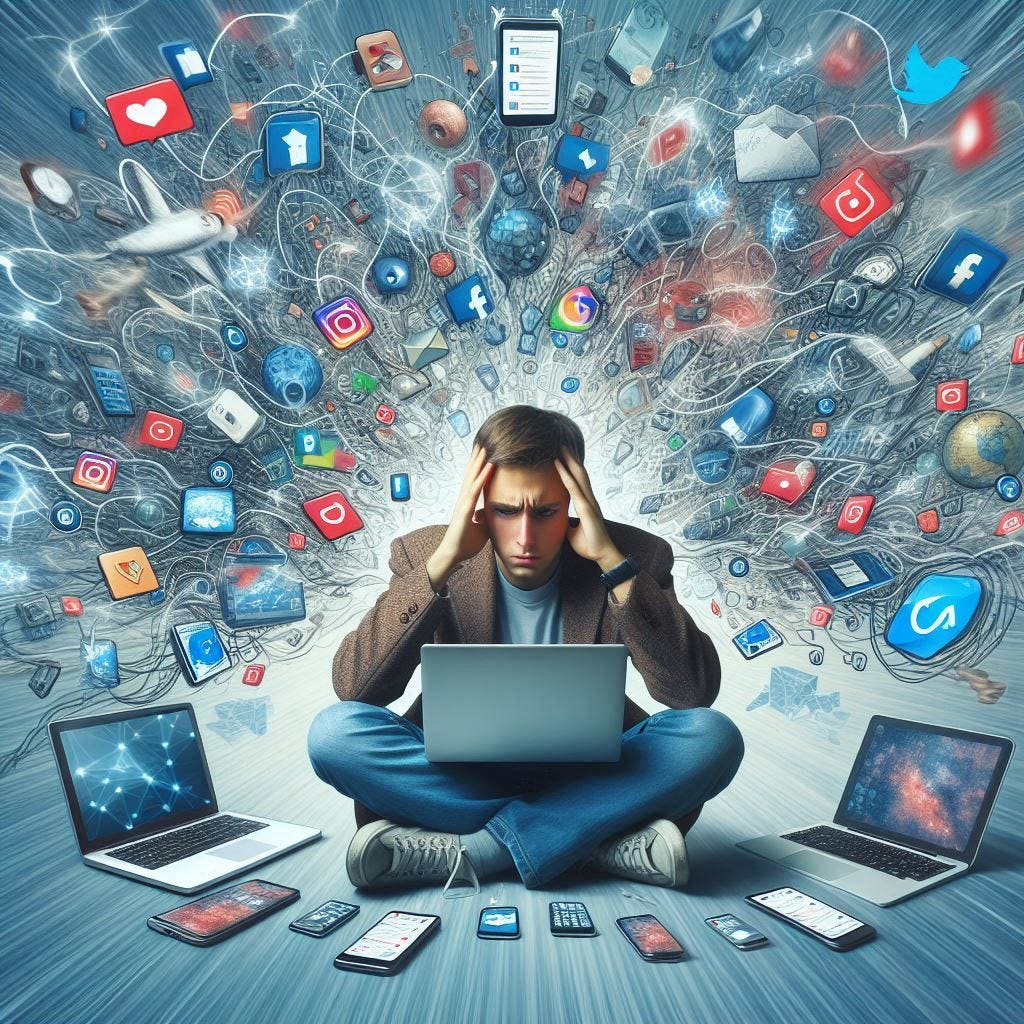#2: Newspapers to Notifications: The Evolution of How We Consume Information
Thank you for joining me on my second article, Feeling stuck in the endless cycle of smartphone scrolling? Constantly lost in the world of infinite content? If so, this article is for you.
Many years ago, we had to wait until the next morning for the newspaper to arrive to catch up on the news. Not everyone could afford a daily subscription, especially in villages. There will be a commonplace in every street where we get the newspaper. People in the street, often share the cost of the newspapers that they like to read. There was always someone managing the subscriptions, and every morning, a few newspapers would arrive at that spot. Before heading to school, I’d often find myself there, catching up on the latest stories. For other types of reading—magazines, books, and special editions—we had the local library. As kids, Sundays were our time to read the other books and newspapers in the library, broadening our minds beyond what was available on our street corner.
I bit forward, in 2016, India witnessed a massive boom in telephone networks. After that many things shifted to online space. Newspapers and physical books slowly gave way to digital content. YouTube quickly gained popularity, offering a treasure trove of long-form videos. Soon after, TikTok revolutionized the space with its addictive short-form content. Every other social media platform was alarmed by this and implemented their version of short-form content, reels, shorts… etc.
While these platforms brought convenience and entertainment, they also introduced new challenges. Short-form content, designed to capture our attention instantly, often pulls us from one video to the next before our brains have even processed the previous one. It’s a cycle of endless scrolling—each swipe bombarding the brain with new information, colors, sounds, and stimuli. Before you know it, your energy feels drained, like a battery at zero percent. On the following day, you might feel tired, not focused, and not motivated, with little interest in the tasks you need to accomplish.
This relentless cycle creates a pattern: reach for your phone, open your favorite app, and fall into the same pit, feeling a brief burst of satisfaction before the fatigue sets in again. These platforms are designed to keep us hooked, leveraging psychological tricks to ensure we keep coming back. The price? Our time, focus, and mental well-being.
I’ve been there myself, struggling with a lack of productivity at work, a disconnect in personal relationships, and a diminished spiritual connection. The constant barrage of content left me feeling overwhelmed and disconnected from my thoughts.
That’s when I discovered something called Personal Knowledge Management (PKM). It’s an approach I’ve started implementing in my daily routine, one step at a time, and it’s already showing promising results.
I am not an expert in this topic, and, I’m not here to suggest you cut off social media, throw away your smartphone, or live under a rock. Rather, I encourage you to be mindful of your content consumption. When you watch a video, read an article, or listen to a podcast, resist the urge to immediately jump to the next thing. Pause. Take a moment to reflect on what you’ve just consumed. If a thought comes to mind, jot it down—whether in a traditional notebook or a digital note-taking app like Apple Notes, Google Keep, Obsidian, or Notion.
This simple practice of capturing your reflections can help you start building a personal knowledge base, giving you something to refer back to rather than letting valuable insights slip away. It reduces anxiety and helps you manage the constant influx of information without feeling overwhelmed.
This week, let's try a simple but powerful exercise: after consuming any type of content— whether it's a video, article, podcast, or social media post — pause for a moment and capture your thoughts. It doesn't matter where you are; just grab whatever you have on hand. Use a note-taking app, or a basic notepad, or even carry a small diary with you to jot down your reflections. It’s all about taking that moment to reflect.
I’d love to hear how this goes for you, so please share your experience in the comments. Let’s start turning our daily content into meaningful insights together!
In this article, I wanted to introduce you to the concept of Personal Knowledge Management and its significance in the age of digital overload. In the upcoming articles, I’ll dive deeper into various techniques to help you manage the growing knowledge you encounter every day from multiple sources.
News Bites:
#1 This week September 17-18, 2024, was big moon day, have you observed the big moon in your region? Unfortunately I couldn’t observe it. If you captured a picture, try to share it with me.

#2 New iPhone Series launched on 20th of septemeber. what are your thoughts about the new series?
#3 How do you react if a mouse jumped from your food package that ordered from your faviourate restarunt? It actually happened. A person opened her food package while she is travelling in the plane a mouse jumped out from the package, prompting the plane to take emergency landing :)






Nice article, Having a PKM is like having your own universe of Wikipedia. instead of dive into an unknown sea you have created a sea into your own desk, you have created that sea of info in a structured way how you like to have it so it's an easy to get info quickly and in focussed way.